There is nothing like waking up in the morning and seeing this out your window.
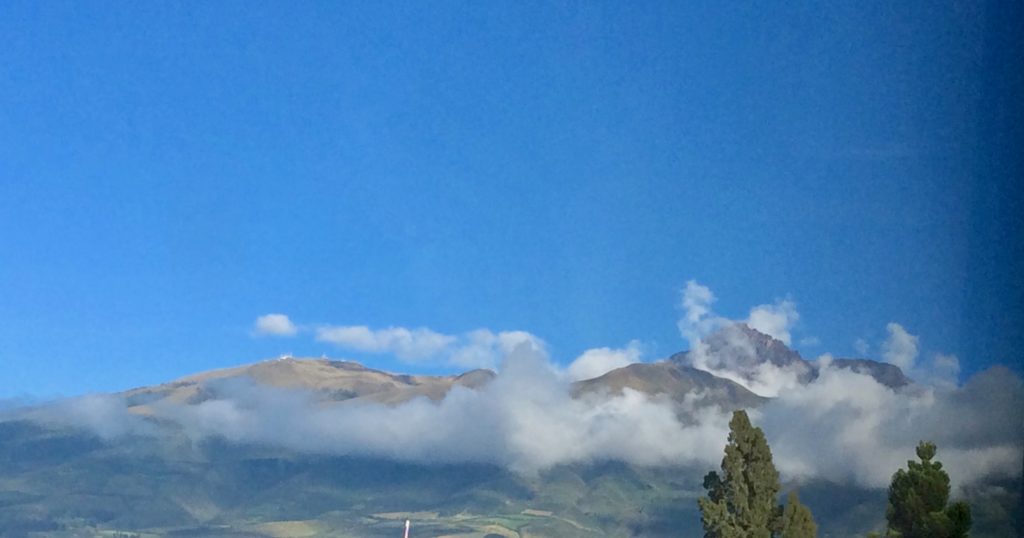
Category: Ecuador Towns
There is nothing like waking up in the morning and seeing this out your window.

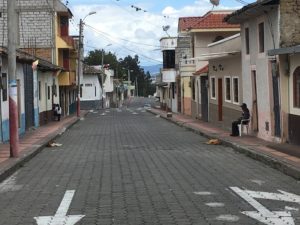
“Be careful in Ecuador, you could get thrown in jail”. Those were the words of my dad when we told him we were going to Ecuador for a visit. I have to say, I feel much safer here than in the US, especially since yet another school massacre has taken place up there since we have been here. There have been zero school shootings in Ecuador this year, and any year for that matter. Children here are precious, and you can see it every day with families holding hands walking down the sidewalks of Cotacachi.
In the week plus that we have been in this small town of Cotacachi, Ecuador, we have wandered all over town by foot. We’ve walked main streets and side streets, and not once, have we felt threatened in this beautiful foreign country.
This is a walking town, so when you walk, you pass many people on the street. Most of these are Mestizo, Spanish, or Quechua (indigenous). Most greet you, or you greet them with Buenos Dias, Buenas Tardes, or Buenas Noches, depending on the time of day. The smiles that come with these greetings are infectious. These are beautiful, friendly people.
The native people really light up when you attempt to speak to them in their language, no matter how bad your Spanish. They are always happy to help you. Gringos are the same way. We have met many in our short period of time here and they are always open to new friendships and sharing their experiences here.
We’ve been to dinner with one couple at their permaculture property on the slopes of Cotacachi volcano, and we have an invitation to visit and spend time on another permaculture farm (Finca), one and a half hours outside of Cotacachi. This, in two weeks time.
We have felt very welcomed and safe our whole time here. It’s very relaxing to be out of the negative vibrations we were feeling in the US. As our time here lengthens, we are starting to feel more and more comfortable. We have two more weeks to go before we head back home to the US.
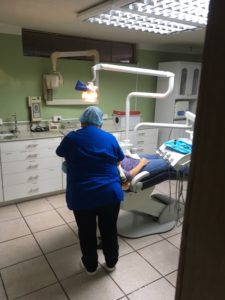 Before we came, we heard that Dr. Bolaños, in Ibarra, was good. He is one of the few in this part of the country who takes credit cards. We emailed him and made an appointment.
Before we came, we heard that Dr. Bolaños, in Ibarra, was good. He is one of the few in this part of the country who takes credit cards. We emailed him and made an appointment.
After a few days in Cotacachi, we began asking for referrals to dentists here. We chose to switch to Dra. Martha Guerra, before seeing Dr. Bolaños, and are satisfied with her expertise. She studied and practiced for 17 years in Europe (Spain and London) so she has all the latest techniques AND she speaks English fairly well. The one drawback is that she doesn’t take credit cards. Hers is a one-person office, where she does it all. A person preferring a more familiar style of professionalism might want to try a different office in a bigger city. Gary is having two crowns replaced. He was pleased with his first appointment, wherein she removed old crowns and installed temporaries. I have had two appointments to take out old metal fillings and replace them. I was happy that she used a dental dam when taking out the old mercury-filled fillings. Dr. Guerra was gentle, compassionate and soothing with me. We have had great conversations in half-English-half-Spanish, with plenty of laughter. Together, we spent an hour translating her intake form into English, for the benefit of future patients.
Quito, the capital city of Ecuador, has plenty of holistic dentists and doctors, as does the next largest city, Cuenca. A person wanting to visit a lower-cost dentist in Ecuador can do a search for “Dental Tourism”. We figured that the cost of our entire month in Ecuador – staying with a friend rather than in hotels – will cost us far less than seeing a U.S. dentist to have this work done.
In a city near us, Ibarra, there is an integrative medicine clinic called The Jade Center. They have a holistic “biological” woman dentist there who gets rave reviews. There seem to be more women dentists than men, from what we’ve observed. The Jade Center is the place to go for chiropractic-type adjustments, as well as yoga classes and courses in herbalism, and more.
Happily, natural health care products are available here in Ecuador. Even in a town as small as Cotacachi, I found two natural products stores. One is called Prana Vital and sells primarily organic food and herbs and soaps and such. The other is called Natural Heath Store or Naturalezay Vida. It is like a natural supplements store in the US, but tiny.
Every Thursday, there are two outdoor organic markets that happen in little nooks off the sidewalk downtown. One is next to a gringa-owned bakery, where expats sell their organic produce, organic yogurt, organic bread, blueberries, crocheted items, organic meats, etc. The other is in an arcade-type space between buildings and sells similar items. It’s nice to see that over the years, the gringos who have been here a long while have been opening up businesses to serve the town and the expat community both. Some of the local Ecuadorians have also opened cafes that cater to expats/tourists. That type of place tends to become a hangout for English-speaking residents. The most popular here in town are called “Serendipity” and “Rock Solid Cafe”. A family from Texas – Mom and Dad, their adult sons and their wives, and a few babies – moved to Cotacachi recently and opened a sports bar. People can get familiar US food there, smoke cigarettes and watch sports on TV. It’s looking like “Travelers & Sportsmen’s Bar” will be successful. Although we are looking for places with health-oriented food & products, some people will be glad for a place to get hamburgers and smoke cigarettes with cheerful Texans.
For health buffs, Cotacachi even has a wonderful “Parque Activo”: a city park with an expansive view of the volcano, filled with exercise machines for adults. These machines are brightly colored, and are really like large-sized playground equipment! We had fun exercising on them.
For those who consider moving to South America but wonder if natural alternative health practitioners and products are available, the news is good in this region. It’s even more prevalent in the larger cities like Ibarra & Cuenca, and in focused areas such as the valley of Vilcabamba (where the hippies all gather and drive the locals nuts). For people like me, it’s great to be able to support my health with herbal products while doing my dental tourism!
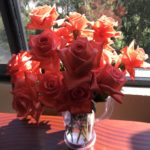 Gary and I fall asleep nightly to a chorus of street dogs barking the news of the day. Some kind of frog makes a croaking that sounds like sticks clicking together. We are awakened at dawn by church bells and roosters. The poor old church bells are non-melodious. They ring at the most random of times – 6:03 and 6:34 am and a few minutes before 7. Same in the evening… they ring at random moments that are somehow predetermined. Even the locals don’t seem to know why they ring at those certain times. After the last dull clang fades, we hear chickens clucking and squawking in waves across the valley. First, one barnyard goes off, then another, then another, echoing off both volcanoes.
Gary and I fall asleep nightly to a chorus of street dogs barking the news of the day. Some kind of frog makes a croaking that sounds like sticks clicking together. We are awakened at dawn by church bells and roosters. The poor old church bells are non-melodious. They ring at the most random of times – 6:03 and 6:34 am and a few minutes before 7. Same in the evening… they ring at random moments that are somehow predetermined. Even the locals don’t seem to know why they ring at those certain times. After the last dull clang fades, we hear chickens clucking and squawking in waves across the valley. First, one barnyard goes off, then another, then another, echoing off both volcanoes.
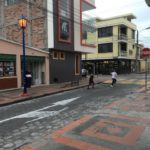 Like Mardi Gras, it’s Carnivale time: the weekend before Lent. Parades of musicians and dancers go down the streets at random times. Boys with squirt guns, water balloons, and shaving cream lurk in doorways, ready to douse the unsuspecting. Nobody is safe! Sidewalks are crowded with people from outlying areas. Both town squares host fireworks. I got squirted with water and shaving cream, and Gary got splashed a few times. When I got bold, I squirted a boy who ran past us with a squirt gun. He was surprised that a gray-haired gringa squirted him. He and his mom laughed with delight.
Like Mardi Gras, it’s Carnivale time: the weekend before Lent. Parades of musicians and dancers go down the streets at random times. Boys with squirt guns, water balloons, and shaving cream lurk in doorways, ready to douse the unsuspecting. Nobody is safe! Sidewalks are crowded with people from outlying areas. Both town squares host fireworks. I got squirted with water and shaving cream, and Gary got splashed a few times. When I got bold, I squirted a boy who ran past us with a squirt gun. He was surprised that a gray-haired gringa squirted him. He and his mom laughed with delight.
One afternoon we take a shuttle bus with expats from various countries to a serene, landscaped estate with stunning views, outside of town. A wonderful charity called “Ami” is housed there. They help indigenous Quechua children in need. Weekly movies help raise funds. The bus costs $1, the movie $5.
At the movie, or in some of the expat-run cafes, it’s nice to meet other “gringos” and discuss why they’re here. The primary reasons are the ability to live off Social Security, inexpensive medical care, temperate weather, and a relaxed lifestyle. Many find the US too dangerous. Those who are most successful at making a good life here are those who learn Spanish and integrate into the local community. It seems that the people who only speak English eventually feel isolated and frustrated by the small pool of acquaintances. There are some younger expat families here, but retirees predominate. Among the expats, a variety of lifestyles, personalities, and priorities exist in a kind of disharmonious harmony. Plenty of disharmonies, but everyone has to share a town anyway, so a type of harmony is created.
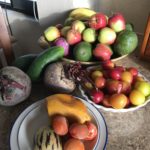 Gary and I walk to the market (Mercado) on Sunday, when they have organic produce. Our backpack brims with tropical fruits. I buy 2 dozen splendid roses for $3. As always, we run into other gringos from our condo community where we’re staying and chat. Everyone shares news about what events are happening and who is hiring a driver to visit which other town or lake or park.
Gary and I walk to the market (Mercado) on Sunday, when they have organic produce. Our backpack brims with tropical fruits. I buy 2 dozen splendid roses for $3. As always, we run into other gringos from our condo community where we’re staying and chat. Everyone shares news about what events are happening and who is hiring a driver to visit which other town or lake or park.
At the Mercado and on the sidewalks, we encounter the Viejas. These are extremely old, tiny Quechua women who have no family. Most are well under 4’ tall, hunched, barefoot. They silently beg for food or coins, alongside the hungry street dogs. At night they sleep in a building called “Home for the Ancients”. The tiniest 3’ tall Vieja with cataracts gets coins and bananas from us when we pass. There are a few Viejos too… little ancient men with blurry eyes, begging.
We feel utterly safe strolling here. The sidewalks are filled with relaxed families and laughing children, plus gringos and vacationers. In the bigger cities, pickpocketing is a problem; it’s best not to carry a purse or have your cell phone in your pocket. In Cotacachi, that is not an issue from what I see. This is a sleepy, safe town where people know one another and not much happens. Everyone greets everyone on the sidewalks. The locals consider the U.S. expats to be, in general, cold and unfriendly because most don’t greet their neighbors as they pass. I get in the habit of greeting everyone and watch their faces light up to greet a friendly gringo.
After the market, we stop at our favorite spot, the Serendipity cafe, to give a few roses to the gorgeous young Quechua owner, Maria. She reaches way up to hug me (she’s 4-1/2’ tall) and draws me into a cheery conversation in Spanish, laughing warmly about my grammar and complimenting my progress. Gary orders guanabana juice and we stroll home, feeling surprisingly at home here in the quiet rhythm of Cotacachi.
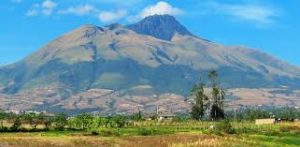
Though the travel to Ecuador was an adventure in itself, it was a pretty boring adventure compared to arriving in this South American country. The best part of Travel Day was meeting “Papa” Ron Cropper in the airport. He is a high-energy dynamo of laughter and joy, talking with everyone around him. We have a lot in common with him, as he just turned 65 and is also spending a month in Ecuador to see if he might like to retire here one day. We will meet up with him again later in our journey.
 On this rainy morning, we rose early and began preparing our house to vacate it for a month. Our housesitter is already partially moved in. The dog and cat are mournful and anxious. So are we, looking at their big sad eyes!
On this rainy morning, we rose early and began preparing our house to vacate it for a month. Our housesitter is already partially moved in. The dog and cat are mournful and anxious. So are we, looking at their big sad eyes!
We fly today to Ecuador. Home of Galapagos turtles, headhunters, Andean shamans, beautiful music, festive parades, affordable dentists, and one of our best friends.
The month-long adventure will be chronicled in photos and writing here. You see links from the site “Transition Concierge International”, where they hired me as a travel writer for this journey.
Come on back in a day or two for the next installments!
~ Bonnie & Gary ~

And so it begins, our Ecuador journey starts with trying to arrange a shuttle ride from the Quito airport to the Wyndham Hotel where we will be staying. We were advised to arrange the shuttle to the hotel ahead of our arrival, at 11:58 pm. I called the Wyndham 800 number to get both the confirmation number and number for the hotel. When I tried the confirmation number on the website, it didn’t work. So, I called the Wyndham in Quito or tried to at least. It took me several tries before I discovered that you have to put 011 in front of the phone number for it to work. That’s Quito’s area code.
After my third try, the hotel answered with the person at the other end rapidly answering in Spanish. My Spanish still stinks, so I didn’t understand a word she said but assumed she was welcoming me to the hotel. After confirming that I didn’t speak or understand enough Spanish, she spoke in English beautifully. I only wished I could do the same in Spanish. As we were speaking, and trying to arrange the shuttle, the call started breaking up, badly. We tried for a good five minutes to find a good connection but it never came back. I ended up just hanging up. I think she got the information but I needed to make sure we had a shuttle pickup arranged. I emailed our friend, Lesley, in Ecuador, to call the hotel from her location and confirm our reservation.
It was a lot of work and time to just arrange a shuttle ride from the airport due to bad connections from the US to Ecuador.
Gary